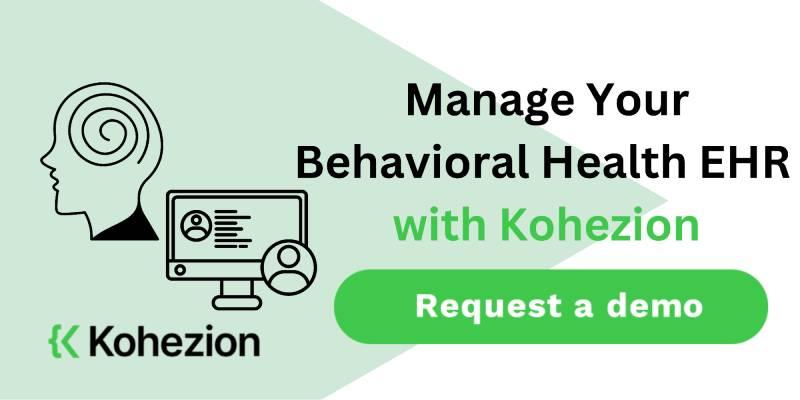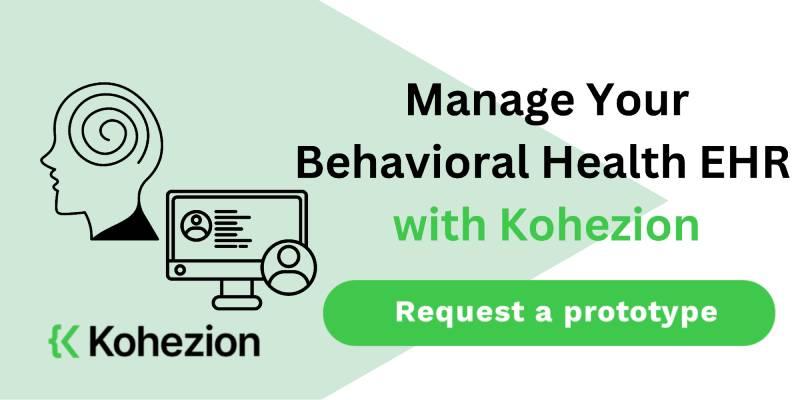As of 2021, over 90% of US hospitals have adopted EHR systems. Behavioral Health EHR systems are designed to improve your practice in many ways. According to surveys, 85% of healthcare providers say that EHRs improve patient care quality, and 75% report better patient information access.
This article looks at the top ten therapy software solutions for 2024. These solutions are made for mental health professionals like you. They meet the special needs of your work.
What is Behavioral Health EHR Software
Behavioral health EHR software is made for mental health practices. It helps manage clinical, administrative, and financial tasks. These systems are different from regular EHRs because they have special features. They offer detailed note-taking and customizable templates for different mental health conditions, simplifying the management of patient care.
This software also helps improve patient engagement with special features for mental health, ensures you follow HIPAA rules to keep patient info safe, and makes communication between providers easier.
Why is Behavioral Health EHR Software Important
Behavioral Health EHR software helps healthcare providers deal with complex challenges, smoothes workflows, reduces paperwork, and improves communication between providers and patients.
Having quick access to digital records helps in making better treatment plans. This supports the long-term care of mental health issues. With healthcare changing fast, an EHR system is the best way to ensure you meet compliance standards.
It also improves documentation, which saves time. This means you can focus more on caring for your patients, which shows the big benefits of using healthcare technology.
Benefits of Behavioral Health EHR Software
Behavioral Health EHR software offers many benefits for your practice. It helps you make smart choices about adding technology to your mental health work.
Increased Practice Efficiency
EHR software automates routine tasks, making your practice more efficient. This automation reduces paperwork, letting you focus more on patient needs. You can then offer better care and work more productively.
Streamlined Practice Management
With EHR software, managing appointments and billing is easier. This means less waiting for clients and better service for them. Keeping records becomes simpler, which means less stress for you.
Increased Profitability and Optimized Revenue Cycle
EHR software helps tracks claims and payments well, reducing losses. You get better insights for planning your finances and using resources wisely.
Improved Patient Engagement
Easy-to-use patient tools help you work better with your clients. Good communication gets patients involved in their care. This leads to better health and happier patients.
Reduced Stationary Costs
Going digital reduces paper costs, saves money, helps the environment, and allows you to use your resources for other important parts of your practice.
Improved Care Coordination
EHR software makes it easier to work with other healthcare providers. Everyone knows what's going on with patient care. This teamwork leads to better health for your patients.
Strengthened Security and Safety
EHR systems use top-notch security to protect against data theft and unauthorized access, which builds trust and keeps care effective.
Improved Patient Experience
Adding an EHR system improves patient care. Patients have smoother visits, quick access to records, and good follow-up care, which makes them happier and more loyal.
Better Connectivity Between Doctors and Hospitals
Finally, EHR software makes it easier for doctors and hospitals to share information, which helps with complete patient care. This shows the big benefits of using EHR software in mental health practices.

10 Best Behavioral Health ERH Software
Here is a list of the 10 best Behavioral Health EHR software solutions for 2024. These tools are designed to meet the specific needs of mental health and substance use treatment providers.
1. Kohezion
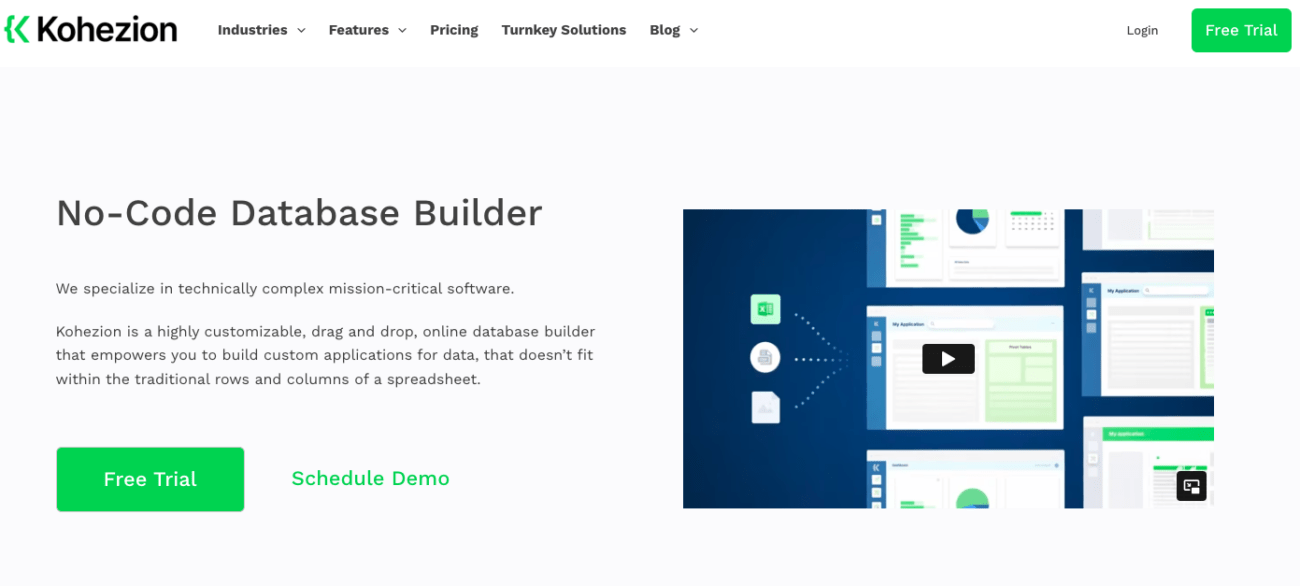
Kohezion is a customizable EHR platform designed for various behavioral health practices. It offers a flexible, user-friendly interface that can be tailored to specific needs, allowing for efficient data management and patient care. The software supports many features, making it suitable for diverse therapeutic settings.
Top 5 Features:
- Customizable templates for different types of therapy
- Integrated billing and scheduling tools
- Real-time data access and updates
- Secure patient communication
- Comprehensive reporting and analytics
Benefits:
- Tailored to specific practice needs
- Streamlined administrative tasks
- Improved patient communication
- Efficient billing processes
- Improved data analysis
Cons:
- Customization may require significant setup time
- Limited integration with some third-party systems
Best For:
- Practices needing high customization
- Organizations looking for integrated billing solutions
2. InSync
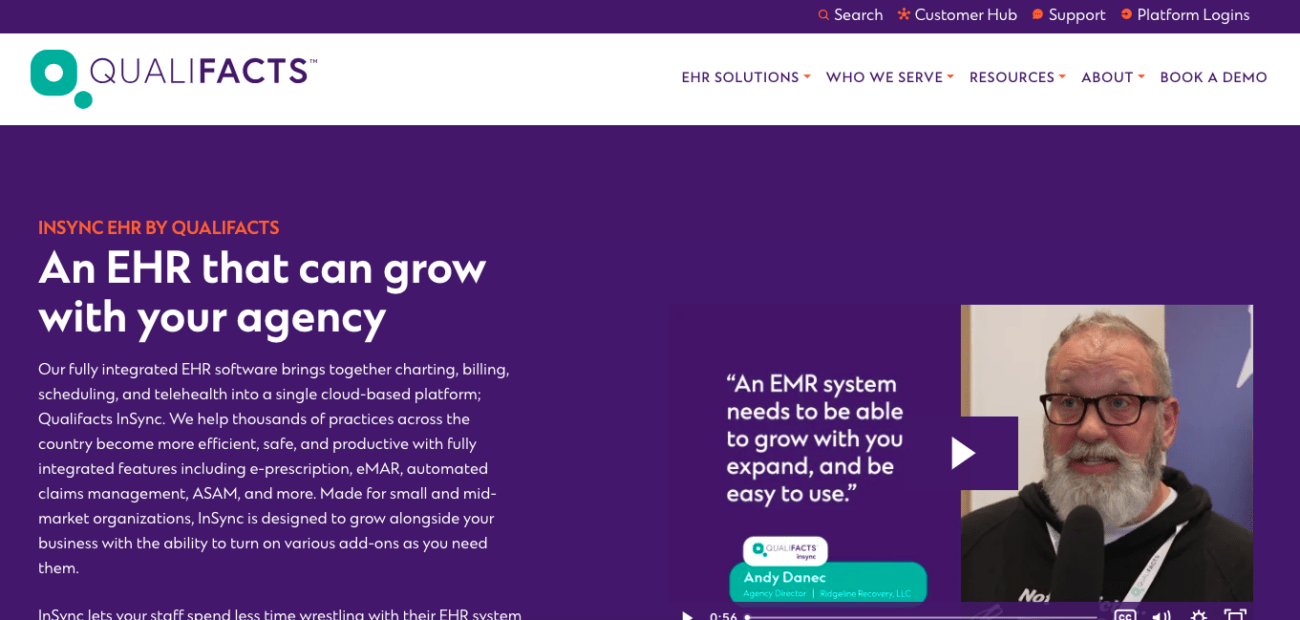
InSync EHR by Qualifacts offers a robust EHR solution for behavioral health that focuses on compliance and clinical documentation. It provides tools for managing patient records, scheduling, and treatment planning, all within a secure, integrated platform. Its user-friendly interface simplifies complex workflows and improves efficiency.
Top 5 Features:
- Integrated billing and claims management
- Comprehensive clinical documentation tools
- Automated scheduling and reminders
- Secure patient portal
- Customizable forms and templates
Benefits:
- Streamlined billing and claims processing
- Improved documentation accuracy
- Improved patient engagement
- Efficient scheduling and reminders
- Customizable to practice needs
Cons:
- Can be complex to navigate initially
- May require extensive training for full utilization
Best For:
- Practices needing comprehensive documentation
- Organizations focusing on compliance and billing
3. Valant
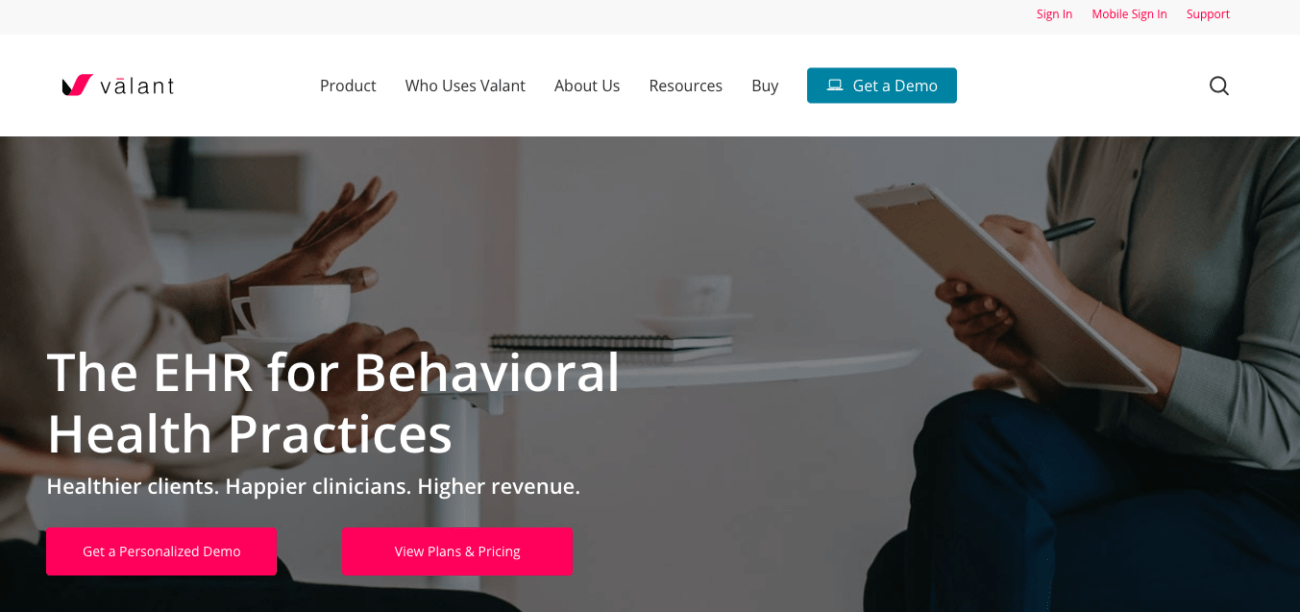
Valant is an EHR and practice management solution for behavioral health providers. It features advanced clinical documentation tools and integrated practice management functionalities, providing a cohesive patient intake and billing experience. The platform aims to improve clinical and administrative workflows.
Top 5 Features:
- Advanced clinical documentation capabilities
- Integrated scheduling and billing
- Patient portal with secure messaging
- Outcome measurement tools
- Customizable templates and forms
Benefits:
- Streamlined clinical and administrative tasks
- Improved patient engagement
- Comprehensive outcome tracking
- Customizable to specific needs
- Efficient billing and scheduling
Cons:
- The interface may feel outdated to some users
- Can be expensive compared to other options
Best For:
- Providers needing advanced documentation tools
- Practices requiring integrated practice management
4. SimplePractice
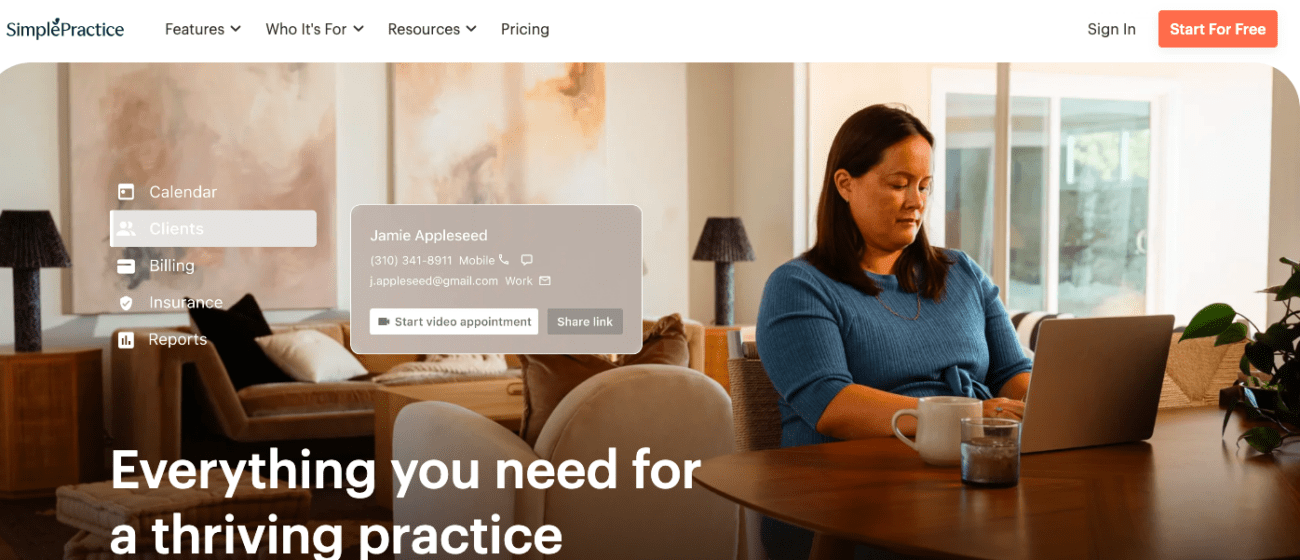
SimplePractice is a popular EHR and practice management software known for its ease of use and comprehensive features. It is designed for a wide range of healthcare providers, including behavioral health professionals, offering tools for scheduling, billing, and clinical documentation in one platform.
Top 5 Features:
- Intuitive user interface
- Online booking and scheduling
- Integrated billing and claims processing
- Telehealth capabilities
- Secure client communication
Benefits:
- User-friendly and easy to navigate
- Streamlined online scheduling
- Efficient billing and claims management
- Convenient telehealth integration
- Secure communication with clients
Cons:
- Limited customization options
- Basic reporting features
Best For:
- Practices seeking a user-friendly solution
- Providers looking for integrated telehealth
5. Opus
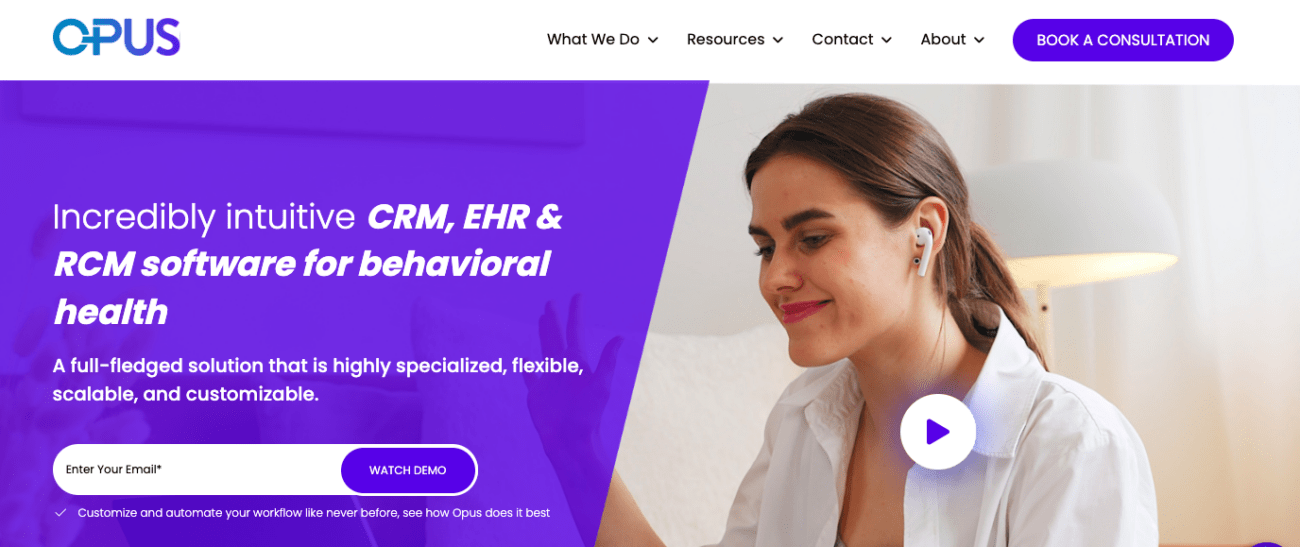
Opus is a flexible EHR platform tailored for behavioral health practices. It offers a range of features designed to support both clinical and administrative tasks, including documentation, scheduling, and billing. The system’s adaptability makes it suitable for various practice sizes and types.
Top 5 Features:
- Customizable clinical documentation
- Integrated scheduling and reminders
- Comprehensive billing solutions
- Secure patient portal
- Outcome tracking and reporting
Benefits:
- Flexible and adaptable to practice needs
- Streamlined administrative processes
- Improved patient management
- Secure and compliant data handling
- Improved reporting and outcome tracking
Cons:
- Can be challenging to configure initially
- Limited third-party integrations
Best For:
- Practices needing flexibility and customization
- Organizations focused on comprehensive reporting
6. Kareo
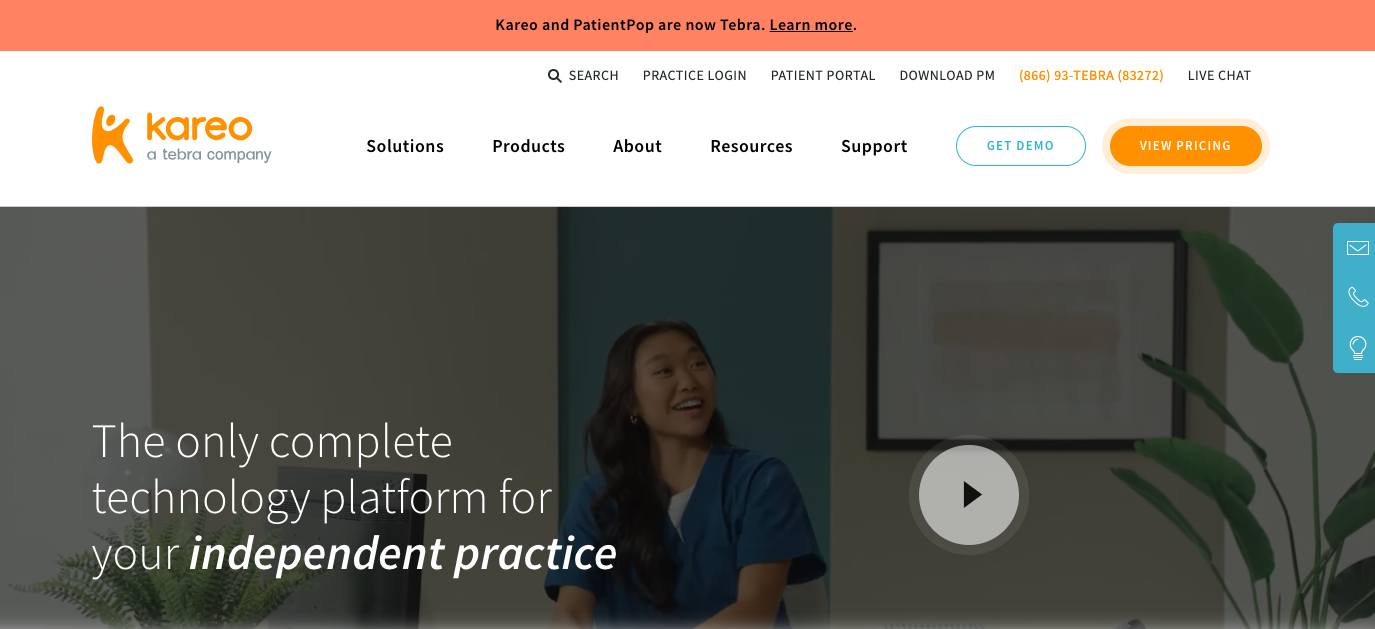
Kareo provides an EHR and practice management solution specifically designed for small to mid-sized practices. It offers tools for managing patient records, billing, and scheduling, focusing on improving practice efficiency and profitability. The platform integrates various aspects of practice management into a unified system.
Top 5 Features:
- Integrated billing and practice management
- Patient scheduling and reminders
- Electronic claims processing
- Customizable templates and forms
- Secure communication tools
Benefits:
- Streamlined billing and claims processes
- Efficient scheduling and reminders
- Comprehensive practice management
- Easy-to-use interface
- Secure patient communication
Cons:
- Limited advanced clinical features
- May not scale well for larger practices
Best For:
- Small to mid-sized practices
- Providers needing integrated practice management
7. ICANotes

ICANotes is a behavioral health EHR known for its focus on simplifying clinical documentation. It offers a range of features designed to improve documentation accuracy and efficiency, including customizable templates and integrated billing. The platform is designed to support a wide range of behavioral health settings.
Top 5 Features:
- Simplified clinical note-taking
- Customizable documentation templates
- Integrated billing and coding
- Secure patient portal
- Outcome tracking and reporting
Benefits:
- Streamlined and accurate documentation
- Customizable to specific needs
- Efficient billing and coding
- Improved patient engagement
- Comprehensive outcome tracking
Cons:
- Limited features for non-behavioral health practices
- Initial setup may be time-consuming
Best For:
- Practices focused on documentation efficiency
- Organizations needing integrated billing and coding
8. TherapyNotes
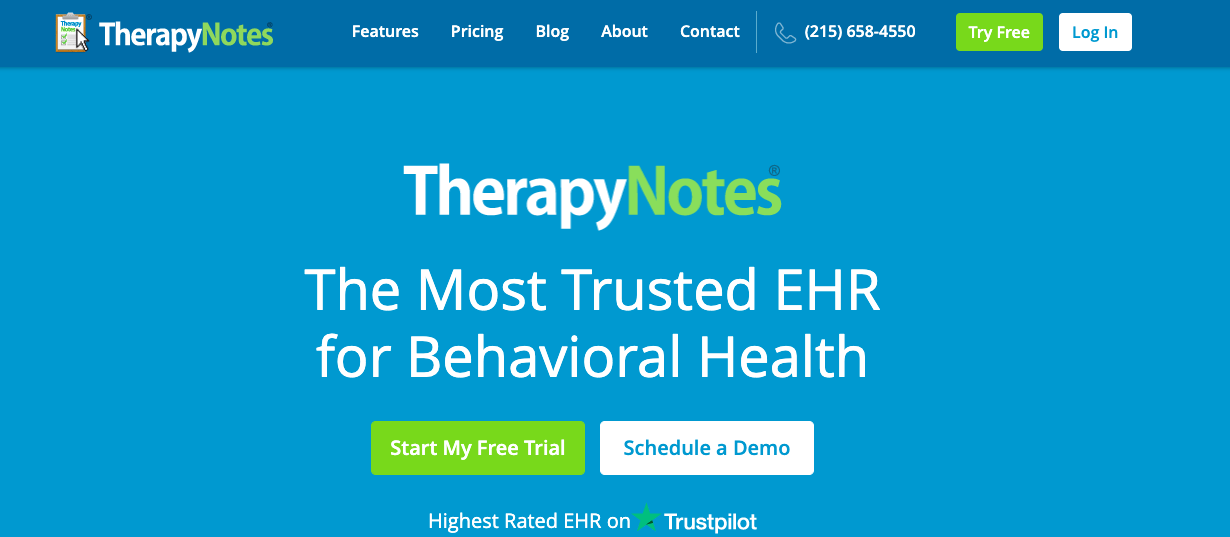
TherapyNotes offers a user-friendly EHR solution designed for mental health professionals. It combines clinical documentation, scheduling, and billing functionalities into one platform. The system is known for its ease of use and efficient workflow management.
Top 5 Features:
- User-friendly interface
- Comprehensive clinical documentation
- Integrated scheduling and reminders
- Secure client portal
- Billing and claims management
Benefits:
- Easy to navigate and use
- Streamlined documentation and scheduling
- Efficient billing processes
- Secure communication with clients
- Comprehensive practice management
Cons:
- Limited customization options
- May lack some advanced features
Best For:
- Mental health professionals seeking an intuitive solution
- Practices needing integrated billing and scheduling
9. Alleva
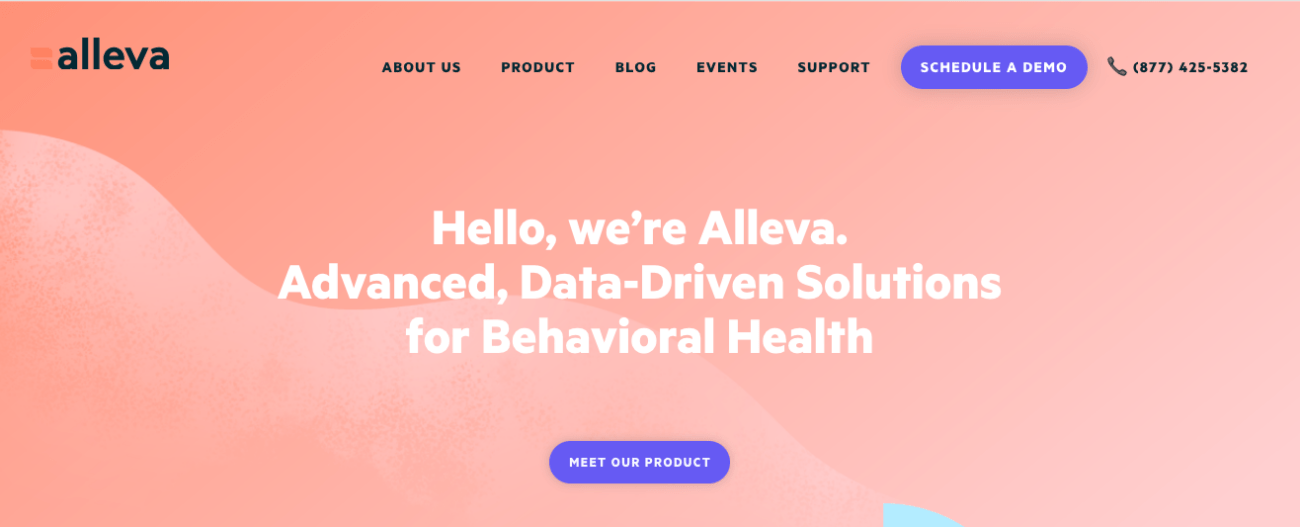
Alleva is an EHR system designed for behavioral health organizations. It offers a range of features to improve clinical and administrative workflows. It provides documentation, billing, and patient management tools, focusing on improving efficiency and patient care.
Top 5 Features:
- Integrated clinical documentation
- Comprehensive billing and coding
- Secure patient communication
- Customizable forms and templates
- Real-time reporting and analytics
Benefits:
- Improved clinical and administrative efficiency
- Streamlined billing and coding
- Improved patient communication
- Customizable to practice needs
- Comprehensive reporting
Cons:
- May require significant training
- Limited third-party integrations
Best For:
- Behavioral health organizations needing a comprehensive solution
- Providers seeking real-time reporting
10. TheraNest

TheraNest offers an EHR and practice management platform tailored for mental health and behavioral health professionals. It includes clinical documentation, billing, and patient management features designed to simplify and improve practice operations. Its user-friendly interface and flexible features make it a popular choice.
Top 5 Features:
- Customizable clinical documentation
- Integrated scheduling and reminders
- Secure billing and claims management
- Telehealth capabilities
- Patient portal with secure messaging
Benefits:
- Flexible and easy-to-use
- Streamlined scheduling and reminders
- Efficient billing and telehealth integration
- Secure patient communications
- Customizable to practice needs
Cons:
- Limited advanced reporting features
- Can be expensive for smaller practices
Best For:
- Mental health professionals needing flexibility
- Practices looking for integrated telehealth solutions
Top Features in Behavioral Health EHR Software
The key EHR software features will help improve your workflow, streamline patient care, and increase efficiency. Here are some important functionalities to consider when looking at EHR software options.
Customizable Templates
Customizable EHR templates let you adjust documentation for different mental health conditions. This makes recording patient info more efficient, ensuring you don't miss anything important during consultations.
Versatile Charting Options
Versatile charting options let clinicians choose the best way to document patient progress. Whether you like free-text notes or structured data entry, these options fit your workflow. This improves efficiency in documenting patients.
E-Prescription Functionality
One big plus of e-prescription is quick and accurate prescription management. This reduces errors, improves patient safety, and helps with better treatment plans through timely medication management.
Patient Access Portal
Adding a patient portal is a great way to communicate with your patients. Patients can securely view their health records, book appointments, and share concerns, which leads to better patient involvement in their care.
Laboratory Integration
Laboratory integration means test results get to you faster. This lets healthcare providers quickly get and understand lab data, which leads to better-informed clinical decisions.
Advanced Note-Taking Features
Advanced note-taking features make documenting patient info easier and more organized. This feature helps streamline your work and ensures better quality of care.
Secure Communication Tools
Secure communication tools ensure that all information sharing meets rules, build trust with patients, and protect sensitive data.
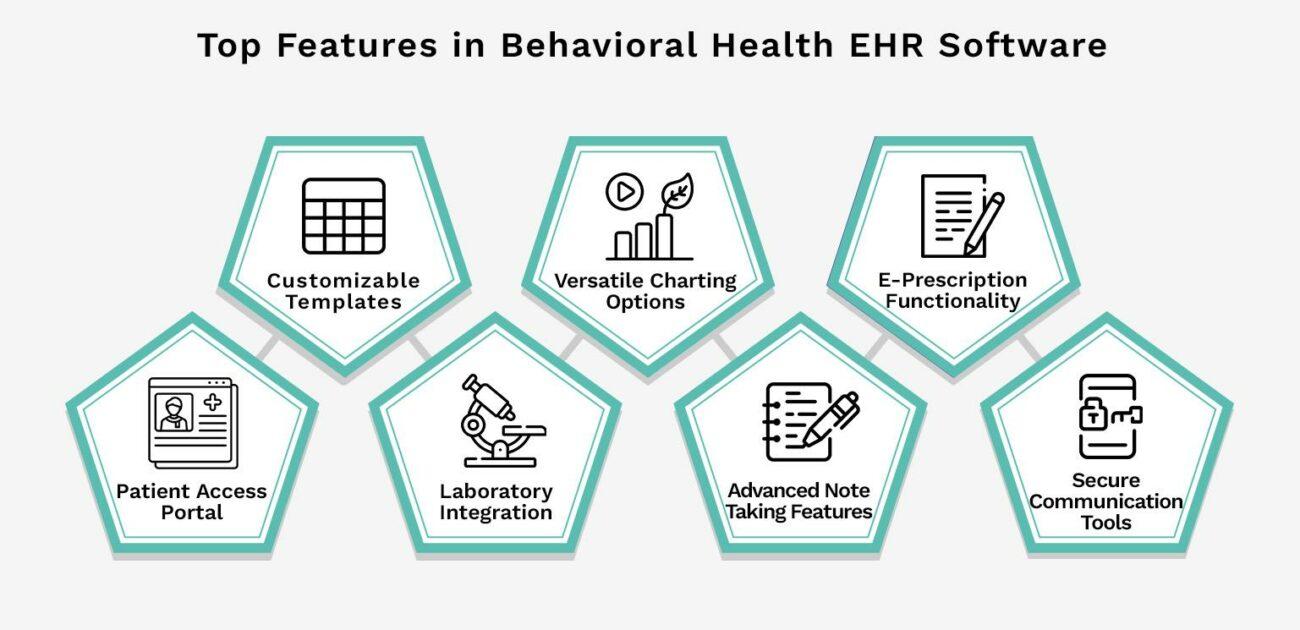
Finding the Best Behavioral Health EHR Software for Your Practice
Choosing the right behavioral health EHR software will make your practice more efficient and help you meet your goals. Think about several factors that fit your specific needs.
Size
The size of your practice affects the EHR software you pick. It matters whether you have a small, medium, or large practice. Consider your number of users and whether the software can grow with you. Picking a solution that fits your current size and can grow is smart. It saves you time and money later.
Certification
Make sure the software is certified by an ONC-authorized testing and Certification Body. This means the software meets important use requirements and follows HIPAA rules, giving you peace of mind.
System Design
Look at the system design of EHR solutions you're interested in. Based on your budget and tech skills, decide if you want an on-premise or cloud-based system. A good system design improves user experience and workflow, helping your practice succeed.

How Much Does Behavioral Health EHR Software Cost?
The cost of behavioral health EHR software varies widely, depending on several factors. First, the deployment method—whether cloud-based or on-premises—significantly impacts EHR software pricing. Some vendors might list a basic price, but be sure to consider hidden costs. These can include expenses related to updates for existing hardware, various support packages, and necessary implementation services.
When setting your budget for EHR, think about more than just the initial software costs. Consider the potential impact on practice throughput during the transition phase. Training for your staff can add another layer of expense, along with any potential overtime work needed for adapting to the new system.
Understanding these nuances will help create a more accurate financial projection and support your practice in choosing the right solution without overspending. Being informed about behavioral health software costs positions you better to make decisions that align with your financial goals while ensuring efficiency and compliance in your operations.
Kohezion: A Behavioral Health EHR Built to Fit Your Needs
Kohezion combines flexibility and customization. It's a top pick for mental health pros. This EHR software is made to fit your practice's needs, helping you give your patients the best care.
Kohezion has an easy-to-use interface. It improves patient engagement and makes documenting easier. You can handle patient data, follow compliance rules, and work more efficiently in one place. Kohezion's mental health solutions let you spend more time on patient care.
It doesn't matter whether you run a small clinic or a big one. Kohezion helps you manage patient information well, making things smoother for you and your patients. Using Kohezion means you can improve the service you offer.
Conclusion
Using a Behavioral Health EHR ensures better efficiency and patient care. It also helps with following the rules for mental health care. EHR software for 2024 brings big benefits, giving practices tools to keep up with healthcare changes and patient needs.
Adding an EHR system to your practice improves your work and gives top-notch care to your patients. This summary shows behavioral health EHR's present and future benefits for managing your practice.
If you’re ready to improve your practice with a Behavioral Health EHR, contact Kohezion today to see how we can support your needs.
Start building with a free account
Frequently Asked Questions
Some common challenges include data migration from old systems, training staff on new software, and ensuring that the EHR meets all regulatory requirements. Also, consider the cost of implementation and ongoing maintenance. Addressing these challenges early on with a clear plan and sufficient resources can help smooth the transition to a new EHR system.
A Behavioral Health EHR incorporates features like secure data storage, access controls, and audit trails. These tools help ensure patient information is handled according to laws like HIPAA. Many EHRs also offer templates and workflows that align with reporting requirements, making it easier to meet regulatory standards.
The primary difference is that Behavioral Health EHR systems are designed specifically for mental health and substance use treatment settings. They include specialized features like progress note templates, treatment plans, and outcomes tracking, which may not be available in general EHR systems. This focus on behavioral health ensures that the software meets the unique needs of mental health providers.
Yes, many Behavioral Health EHR systems include telehealth features or can integrate with telehealth platforms. This allows providers to conduct virtual appointments, which is especially important for patients with difficulty accessing in-person care. Telehealth integration also ensures that all patient interactions are documented within the EHR, maintaining a comprehensive care record.
